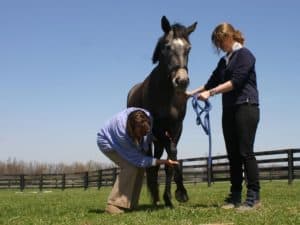McDonnell to Discuss Horse Behavior during Free Lecture
- Topics: Article, Behavior, Educational Opportunities
On Tuesday, Nov. 5 at 6:30 p.m., Sue McDonnell, PhD, Cert. AAB, will present the lecture “Ten Important Observations of Health-Related Natural Horse Behavior” as part of the University of Pennsylvania School of Veterinary Medicine (Penn Vet) First Tuesday Lecture Series.
McDonnell, an equine behavior specialist, maintains a semi-feral herd of ponies specifically for the study of their physiology and behavior in semi-natural conditions, living on the New Bolton Center campus. She will explain her Top 10 important observations regarding the behavior of horses living under natural social and environmental conditions. These observations are known or suspected to be important factors underlying the extraordinarily good health, fertility, and freedom from injury of these horses compared with domestically managed horses. McDonnell hopes to inspire thoughtful discussion of how the health and welfare of domestic horses could be improved with simple, often inexpensive, management changes regarding these behavioral concepts.
McDonnell is an adjunct professor of reproductive behavior at New Bolton Center and is board-certified in Applied Animal Behavior. She is the founder and head of the Penn Vet Equine Behavior Program where her work includes clinical, research, and teaching activities focused on horse behavior.
During the First Tuesday Lecture Series, faculty and clinicians at New Bolton Center share current information on topics of interest and relevance to horse owners and caregivers throughout the region via a free lecture on the first Tuesday of each month. Many of the lectures highlight the advanced techniques performed by Penn Vet’s team of leading clinicians and the state-of-the-art equipment and facilities available to ensure the best possible outcomes for patients
Create a free account with TheHorse.com to view this content.
TheHorse.com is home to thousands of free articles about horse health care. In order to access some of our exclusive free content, you must be signed into TheHorse.com.
Start your free account today!
Already have an account?
and continue reading.
Written by:
Edited Press Release
Related Articles
Stay on top of the most recent Horse Health news with












